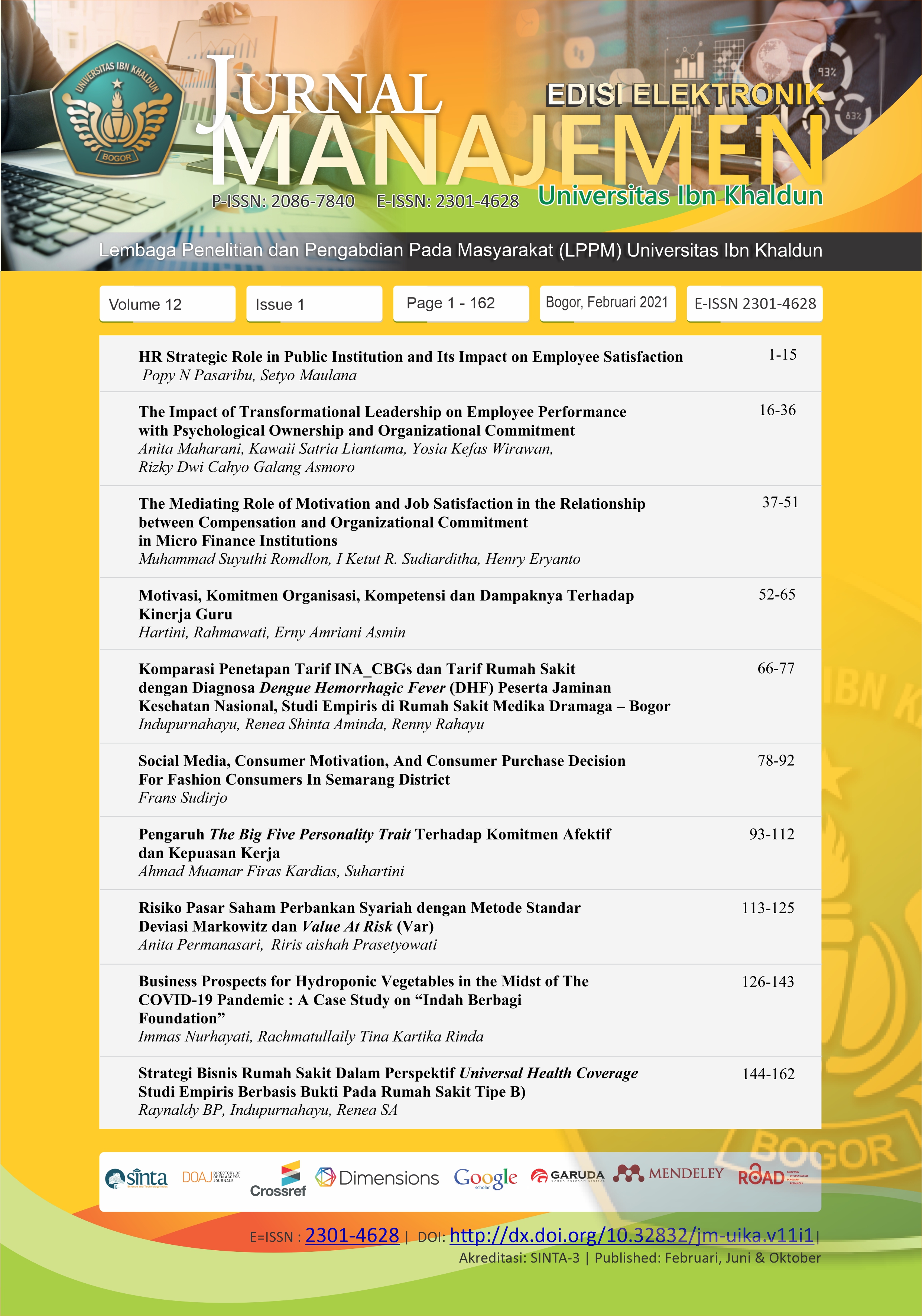Business Prospects for Hydroponic Vegetables in the Midst of The COVID-19 Pandemic : A Case Study on "Indah Berbagi Foundation”
DOI:
https://doi.org/10.32832/jm-uika.v12i1.4043Kata Kunci:
Covid-19 Pandemic, Digital Ethnography, Hydroponic, Payback Period, ResilienceAbstrak
The Covid-19 outbreak has occurred and has had a substantial impact on many aspects of public life that are not only a health problem, but also affect the world economy and the environment in various ways. It seems that no country can avoid it and is not affected by its existence, and Indonesia is no exception. The main objective of this study is to determine the economic resilience of the community in dealing with Covid 19 pandemic espesially in hydroponic vegetable business. Data were collected through in-depth interviews with hydroponic activists, documentation and observation conducted during September 2020. The collected data were analyzed through data triangulation. The results show that hydroponic vegetable business developed by Indah Berbagi Foundation has implemented the floating hydroponic method or also known as the Floating Raft method and the Nutrient Film Technique (NFT) system. Hydroponic vegetable business was profitable and the technology used compatible with characteristics of areas that have limited land. During the pandemic, the public demand for hydroponic vegetables increased quite high along with the increasing awareness of the public to consume healthy vegetables to maintain endurance, therefore in addition to providing good nutrition for body resistance during a pandemic. Using payback period method, it's known that the hydroponic vegetable business can provide benefits and fast return on investment so that it is very useful in supporting the economic resilience of the communityReferensi
Achmad, Z. A., & Ida, R. (2018). Etnografi Virtual Sebagai Teknik Pengumpulan Data Dan Metode Penelitian. The Journal of Society & Media, 2(2), 130. https://doi.org/10.26740/jsm.v2n2.p130-145
Al-Ani, M. K. (2015). A strategic framework to use payback period in evaluating the capital budgeting in energy and oil and gas sectors in Oman. International Journal of Economics and Financial Issues, 5(2), 469–475.
Avgoustaki, D. D., & Xydis, G. (2020). Indoor vertical farming in the Urban nexus context: Business growth and resource savings. Sustainability (Switzerland), 12(5), 1–18. https://doi.org/10.3390/su12051965
Baldwin, R., & Di Mauro, B. W. (2020). Economics in the Time of COVID-19. Retrieved from www.cepr.org
Bivisyani, Q. (2020). Payback Period, Kelebihan Dan Manfaatnya Dalam Bisnis Maupun Industri. Retrieved from https://www.jojonomic.com/blog/payback-period/
Creswell, J. (2015). Riset Pendidikan (Perencanaan, Pelaksanaan, dan Evaluasi Riset Kualitatif & Kuantitatif). Yogyakarta: Pustaka Belajar.
Daraini, I. N. (2020). Etnografi Digital, Alternatif Teknik Pengambilan Data dan Metode Penelitian di Masa Pandemi COVID-19. Lembaga Ilmu Pengetahuan Indonesia. Retrieved from https://pmb.lipi.go.id/etnografi-digital-alternatif-teknik-pengambilan-data-dan-metode-penelitian-di-masa-pandemi-covid-19/
Denzin, N. K. (1997). (1997). The Research Act: A Theoretical Introduction to Sociological Methods. McGraw-Hill.
Disnakertrans. (2020). DKI Jakarta perpanjang PSBB. Dinas Tenaga Kerja Dan Tranmigrasi DKI Jakarta. Retrieved from https://disnakertrans.jakarta.go.id/
Domingues, D.S., Takahashi, H.W., Camara, C.A.P. and Nixdorf, S. L. (2012). Automated System Developed to Control pH and Concentration of Nutrient Solution Evaluated in Hydroponic Lettuce Production. Computers and Electronics in Agriculture, 84, 53–61. Retrieved from http://dx.doi.org/10.1016/j.compag.2012.02.006
Journal of Business Research. (2020). Effects of COVID-19 on business and research. 117(June), 284–289. https://doi.org/10.1016/j.jbusres.2020.06.008
Kementrian Pertanian. (2014).
McKibbin, W. J., & Fernando, R. (2020). The Global Macroeconomic Impacts of COVID-19: Seven Scenarios. SSRN Electronic Journal, (April). https://doi.org/10.2139/ssrn.3547729
Noble, H., & Heale, R. (2019). Triangulation in research, with examples. Evidence-Based Nursing, 22(3), 67–68. https://doi.org/10.1136/ebnurs-2019-103145
Norman K. Denzin. (2009). A Theoretical Introduction to Sociological Methods. https://doi.org/https://doi.org/10.4324/9781315134543
Nurhayati, I. (2020). The Determination of the Main Production Cost of Jipang Cake Using the Full Costing Method. Jurnal Manajemen, 11(1), 26. https://doi.org/10.32832/jm-uika.v11i1.2607
Nurhayati, I., & Suharti, T. (2016). IBM Analisis Nilai Tambah dan Strategi Pengembangan Agro Industri Susu Olahan di Kabupaten Bogor. Jurnal Ilmiah Akuntansi Dan Keuangan, 11(2), 1–10.
Rabbani, L. R., Harisudin, M., Qonita, A., Studi, P., Fakultas, A., Universitas, P., & Maret, S. (2017). Analisis Usaha dan Strategi Pemasaran Hidroponik pada UMKM Bakoel Sayur Kabupaten Karanganyar. AGRISTA, 5(1), 58–67.
Sharma, N., Acharya, S., Kumar, K., Singh, N., & Chaurasia, O. P. (2018). Hydroponics as an advanced technique for vegetable production: An overview. Journal of Soil and Water Conservation, 17(4), 364. https://doi.org/10.5958/2455-7145.2018.00056.5
Souza, S. V., Gimenes, R. M. T., & Binotto, E. (2019). Economic viability for deploying hydroponic system in emerging countries: A differentiated risk adjustment proposal. Land Use Policy, 83(March), 357–369. https://doi.org/10.1016/j.landusepol.2019.02.020
Stamalevi, J. (2015). The Importance of Payback Method in Capital Budgeting Decisions. South American Journal of Management, 1(2), 1–6.
Sugiyono. (2013). Metode Penelitian Kombinasi (Mixed Methods). Bandung: Alfabeta.
Suliyanto. (2008). Teknik Proyeksi Bisnis. Yogyakarta: ANDI.
Suliyanto. Andi. (2008). Teknik Proyeksi Bisnis. Yogyakarta: ANDI.
Taufik, & Ayuningtyas, E. A. (2020). Dampak Pandemi Covid-19 Terhadap Bisnis Dan ( the Impact of Covid-19 Pandemic on Business and Online. Jurnal Pengembangan Wiraswasta, 22(01), 21–32. https://doi.org/10.33370/jpw.v22i1389
Wibowo, A. (2020). Presiden Tetapkan COVID-19 Sebagai Bencana Nasional. Badan Nasional Penanggulangan Bencana. Retrieved from https://bnpb.go.id/berita/presiden-tetapkan-covid19-sebagai-bencana-nasional
Yeasmin, S., & Rahman.K.F. (2012). ' Triangulation ' Research Method as the Tool of Social Science Research. Bup Journal, 1(1), 154–163. Retrieved from http://www.bup.edu.bd/journal/154-163.pdf
Unduhan
Diterbitkan
Cara Mengutip
Terbitan
Bagian
Lisensi
Authors who publish with this journal agree to the following terms:
- Authors retain copyright and grant the journal right of first publication with the work simultaneously licensed under a Creative Commons Attribution-NonCommercial-ShareAlike 4.0 International License that allows others to share the work with an acknowledgement of the work's authorship and initial publication in this journal.
- Authors can enter into separate, additional contractual arrangements for the non-exclusive distribution of the journal's published version of the work (e.g., post it to an institutional repository or publish it in a book), with an acknowledgement of its initial publication in this journal.
- Authors are permitted and encouraged to post their work online (e.g., in institutional repositories or on their website) prior to and during the submission process, as it can lead to productive exchanges, as well as earlier and greater citation of published work (See The Effect of Open Access).











